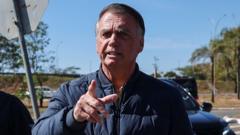A tangled dispute involving Armenia’s Prime Minister and the Apostolic Church escalates toward a bitter confrontation, threatening political stability ahead of upcoming elections.
**Armenia’s Political Crisis Deepens Amid Church Dispute**

**Armenia’s Political Crisis Deepens Amid Church Dispute**
Tensions rise as Prime Minister Pashinyan considers drastic measures to counter religious accusations.
Armenia is caught in a tumultuous political struggle as Prime Minister Nikol Pashinyan finds himself at loggerheads with the Armenian Apostolic Church. The dispute has turned particularly heated, involving mass arrests, serious allegations of coup plotting, and an outrageous offer from Pashinyan to reveal personal details of his faith to confront allegations questioning his Christianity.
The conflict intensified when a priest from Masis accused Pashinyan of being circumcised and thus less than a true Christian. Pashinyan, who has relied heavily on social media since his rise to power following the Velvet Revolution of 2018, offered to prove the priest wrong by exposing himself. This bizarre statement reflects a broader struggle for power between Pashinyan and the church, which has become increasingly vocal against his government since Armenia’s defeat in the 2020 war with Azerbaijan.
This clash began in late May when Pashinyan accused Catholicos Karekin II, the head of the Armenian Church, of violating his celibacy vow and fathering a child. The church responded by accusing Pashinyan of causing division in Armenia’s spiritual community without addressing the allegations of the child. Following these accusations, the Armenian government affiliated media circulated claims about Karekin II's alleged daughter, which fueled public disdain.
As tensions surged, hundreds gathered in Yerevan to support Karekin II upon his return from the UAE. He urged unity in the face of escalating tensions with the government. However, security measures have tightened dramatically; recent police operations have seen the arrests of 16 individuals, including senior clergyman Archbishop Bagrat Galstanyan and other political figures who allegedly plotted to instigate terror to undermine Pashinyan’s government. The official narrative accuses them of forming operational groups for violent uprisings. In contrast, their legal representatives denounce these charges as a method of political repression.
The controversy deepened with the arrest of Russian-Armenian billionaire Samvel Karapetyan, who was seen as a prominent Church benefactor and supporter. Following his arrest for allegedly calling for the seizure of power, Pashinyan announced intentions to nationalize his major asset, the Electric Networks of Armenia.
As the Armenian government navigates these schisms, public concern grows over the potential for renewed conflict, particularly as the nation approaches a critical election year. With the Church now positioned as a significant opposition force, the unfolding situation may have lasting consequences for the nation’s governance and societal unity.
The conflict intensified when a priest from Masis accused Pashinyan of being circumcised and thus less than a true Christian. Pashinyan, who has relied heavily on social media since his rise to power following the Velvet Revolution of 2018, offered to prove the priest wrong by exposing himself. This bizarre statement reflects a broader struggle for power between Pashinyan and the church, which has become increasingly vocal against his government since Armenia’s defeat in the 2020 war with Azerbaijan.
This clash began in late May when Pashinyan accused Catholicos Karekin II, the head of the Armenian Church, of violating his celibacy vow and fathering a child. The church responded by accusing Pashinyan of causing division in Armenia’s spiritual community without addressing the allegations of the child. Following these accusations, the Armenian government affiliated media circulated claims about Karekin II's alleged daughter, which fueled public disdain.
As tensions surged, hundreds gathered in Yerevan to support Karekin II upon his return from the UAE. He urged unity in the face of escalating tensions with the government. However, security measures have tightened dramatically; recent police operations have seen the arrests of 16 individuals, including senior clergyman Archbishop Bagrat Galstanyan and other political figures who allegedly plotted to instigate terror to undermine Pashinyan’s government. The official narrative accuses them of forming operational groups for violent uprisings. In contrast, their legal representatives denounce these charges as a method of political repression.
The controversy deepened with the arrest of Russian-Armenian billionaire Samvel Karapetyan, who was seen as a prominent Church benefactor and supporter. Following his arrest for allegedly calling for the seizure of power, Pashinyan announced intentions to nationalize his major asset, the Electric Networks of Armenia.
As the Armenian government navigates these schisms, public concern grows over the potential for renewed conflict, particularly as the nation approaches a critical election year. With the Church now positioned as a significant opposition force, the unfolding situation may have lasting consequences for the nation’s governance and societal unity.



















